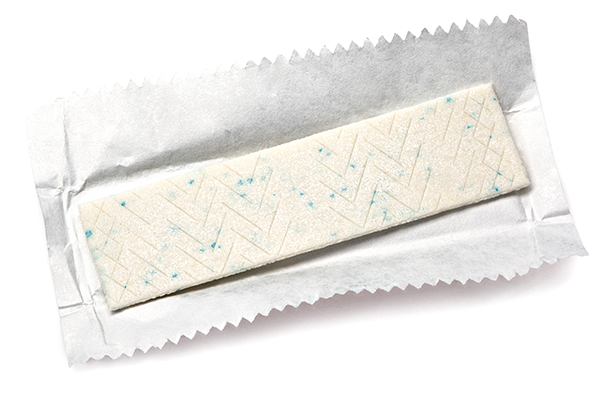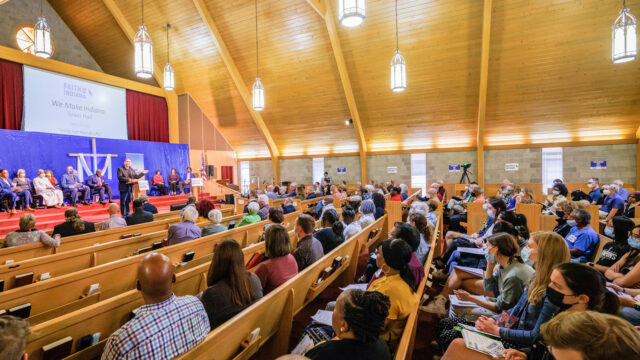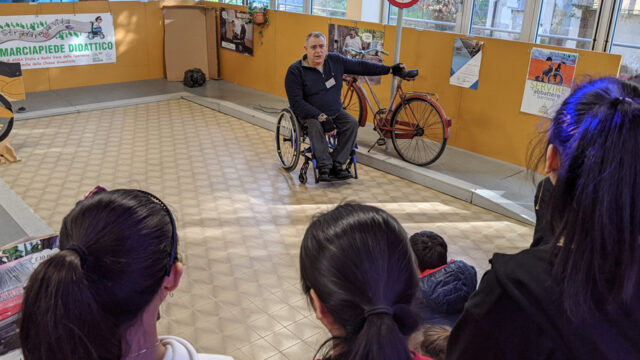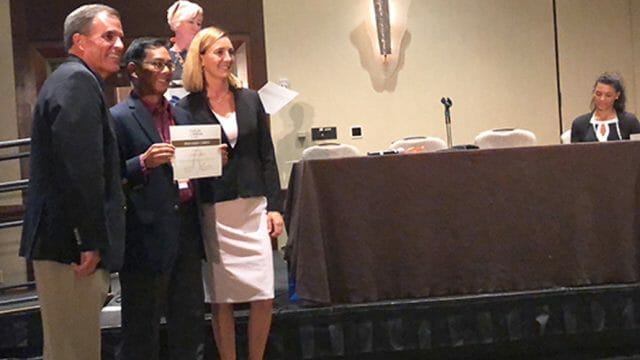Lessons from a stick of gum

This morning after I got home from taking my older daughter’s two children to their preschool, I burst into tears. A week or two ago I had told them they needed to be in the car and buckled up by 8:30 in order to get their reward for being on time—a stick of sugarless gum. I never expected they would be late today.
Their parents had gotten them both dressed before they left for work, and they ate breakfast much earlier than usual. All they had to do was brush their teeth and go to the car. But they must have my genes. They frittered away the minutes playing, or dawdling at the few necessary things they had to do. I tried to give them increasingly frequent and urgent updates on how much time they had left before they would lose their gum.
CJ finished brushing his teeth while my 4-year-old granddaughter, Elisha, took her time finishing her orange juice. Then she got distracted re-taping her bow-and-arrow set’s target to the front door. By the time Elisha started to brush her teeth, there were less than ten minutes left. Sensing that they were going to lose their on-time reward, my anxiety grew. As I stood beside her fretfully, she asked me to bring a chair to stand on, so she could more easily rinse her mouth. Instead, I grabbed her around the waist and held her over the sink to save time. I thought, Why can’t you just rinse your mouth a couple of times, instead of six or seven times? But I kept my mouth shut, believing that she somehow needed to grow up faster and self-learn how to adjust to changing situations, thereby not missing pressing deadlines.
Only two or three minutes were left when the children began putting their shoes on. I told them they could still get a half-stick of gum if they were buckled in by 8:31. CJ had begun playing while he was waiting for us, but now his body switched into high gear as he imagined the prospect of losing his gum. In the meantime, I loaded the car quickly, then came back to hurry them out. CJ dashed out the door, but started playing around on the driveway. I came back for Elisha, locked the front door behind us, and told them to get into the car quick. CJ scrambled into his booster seat and right away worked to secure his shoulder/lap belt. I helped Elisha to quickly sit in her car seat while telling the children they had less than a minute left to buckle up in order to get a half-stick of gum.
I began helping Elisha fasten her car seat straps, but she told me she could do it herself. Why does she choose today to start being so independent? I quickly tightened the strap as soon as she had it fastened, then looked at my watch. It was 8:32—too late! Without saying anything I glanced over at CJ, who was not moving. I asked, “Are you done?” “Yes.” I hadn’t been paying attention to him. I had to give him the benefit of the doubt.
Justice or Mercy?
My unbending sense of justice left me with no choice but to give half a stick of gum to CJ and nothing to Elisha—the worst of all possibilities. I pulled out the stick of gum. But before tearing it in half, I remembered how badly chewing gum interfered with my grandson’s ability to pray intelligibly. “Anyone want to pray?” Elisha, who rarely volunteers, piped up, “I’ll pray.” The last part of her prayer burned into my distracted mind, “And help us not to be so sad because we only get half a piece of gum.” How she was able to adjust to the changing situation! What a mature, gracious acceptance of the way things are, even when all doesn’t go the way we had wished!
But I must confess that I am still having trouble learning such things. I tore the stick of gum in half and gave one to CJ. “Elisha, you were too late. You don’t get any gum today.” Of course, she burst into tears. After all, she had merely prayed for the grace to accept less than a full stick of gum, not for the superhuman grace of being quiet and content with getting nothing at all.
As I got into the car, I heard Elisha say, through her tears, “Grandpa, you ruined my plan!” “I ruined your plan?” I asked. After this attempt at clarification failed a couple of times, CJ could see that I was not getting it. “Grandpa, she’s saying, ‘You ruined my land.’” “Land? I ruined your land?” CJ tried to explain, “Her land—like her whole body, all the little dots are exploding.” Oh, I thought, like “My world is ruined!” Then she said, as if to help a grandpa understand, “You shattered my heart!”
I told Elisha that it was a hard lesson, but a good one for her to learn. “CJ knows how to hurry up and do things quickly, but you still need to learn.” “You make me angry,” she shot back. Trying to sound grown-up, I calmly replied, “I did it on purpose, because you need to learn.” Subsequently, she stopped crying, but still had to remind me once not to talk.
When we arrived at school, I busily engaged in getting the children out of the car and to the front door of their in-home preschool. When the door opened, they stepped in. As I was walking away, I heard something, and turned to see Elisha holding out her arms as the door was closing. “Hug!” she pleaded. But today it was very hectic, and the door closed quickly. I waited for a few seconds to see if one of the teachers would open the door, searching for a quick means of pacifying a wailing child. But it never happened.
Learning My Own Lesson
And so here I am back home with time to learn my lesson. Of course, my stony heart should have been touched by my granddaughter’s prayer. I should have given her the other half-stick of gum. After all, no one would have known but me that the law of “No gum after 8:30” had been set aside. I had thought, however, that Elisha needed to learn that love is sometimes expressed in justice. But I had my own lesson to learn—that at some other times, love is expressed in mercy.
I owe my granddaughter a sincere apology, but I don’t know if she will remember her hurt when I pick her up this afternoon. By then, the whole episode may have seeped down into the unconscious, inaccessible parts of her mind. By then she may be laughing and giggling as she horses around with her big brother, fighting over who’s day it is to choose this or that. But this incident, which she may soon be unable to bring to mind, will have its influence on her life. It will have its place, in a long line of other repeated incidents, in shaping her fast-developing perceptions of her grandpa, her society and culture, and her Creator. She’s learning that life is not fair, and I am now one of her best teachers. She will struggle to trust God. It will be difficult for her to surrender her life to Someone who seems so unreasonable. But without that surrender, she will never know the true joy of life.
I am not by any means hopeless. Love always has an answer. Her prayer was answered, even though she prayed only for what she thought she needed. She was consoled, beyond what she prayed for. Her arms were extended out to me, someone who had been so unmerciful to her. Somehow, even if I should die and never see her again, she must still know that I loved her.
The Delicate Dance of Love
It is not easy to perform the delicate dance of love, alternating between expressions of stern justice and compassionate mercy. God is expert at it. Still, how difficult it must be to get the message across to His human children, with our minds full of grievances over unfair treatment. Even God must struggle as He tries to communicate truth to people who habitually say, “My way is hidden from the Lord, and my just claim is passed over by my God” (Isa. 40:27, NKJV).* Regardless, Love finds a way. The Word will find expression, whatever it takes. No suffering is too intense to be refused. God will leave no stone unturned to get through to our fearful, doubting hearts with His love.
When human words are insufficient, God’s love communicates still. Praise God! He can break through years of accumulated grievances. Even though “my land is ruined” by my misapprehension of God’s motives, His character, and His actions, His love will still find a way to reach my heart.
* Texts credited to NKJV are from the New King James Version. Copyright ã 1979, 1980, 1982 by Thomas Nelson, Inc. Used by permission. All rights reserved.








